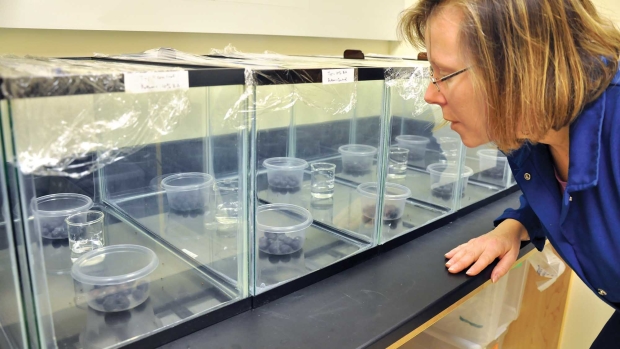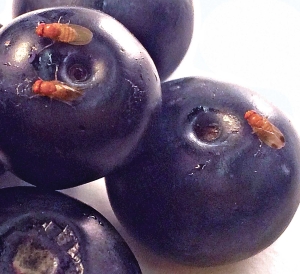
Christine Krause Pham monitors spotted wing drosophila activity in her experiments.(Courtesy University of California, Riverside)
The spotted wing drosophila, a pesky new pest of cherries and other fruits, appears to be repelled by a non-toxic, pleasant-smelling product called butyl anthranilate (BA).
Christine Krause Pham, a graduate student at the University of California, Riverside, and entomology professor Dr. Anandasankar Ray conducted lab experiments in which they exposed spotted wing drosophila to blueberries, one of its favorite hosts. One bowl of fresh, ripe blueberries had been coated with BA and the other was coated with a solvent, as a control.
BA, which is found in low concentrations in several fruits, smells like grapes and is commonly used as a flavor and fragrance compound. It is classified as generally recognized as safe (GRAS) and is approved for human consumption as a food additive.
Laboratory tests showed that spotted wing drosphila (Drosophila suzukii) flies were repelled by BA. The product targets the same receptors in the insect’s antennae as DEET (diethyltoluamide), the most common active ingredient in insect repellents.
Also, the flies were less inclined to lay eggs on treated blueberries, Ray reported. A single treatment of 2.5 percent BA reduced the number of eggs, larvae, and pupae in the fruit by around 50 percent. A 10 percent treatment almost prevented reproduction.
The next step is to test how well BA works in field trials. If it is successful, the scientists will request approval from the U.S. Environmental Protection Agency.
Cherry fruit fly

Spotted wing drosophila love blueberries, though not when they’ve been treated with butyl anthranilate. The male fly has a dark spot at the tip of its wings. (Courtesy University of California, Riverside)
Spotted wing drosophila, which originated in Asia, was first found in the United States in 2008. Unlike the common fruit fly, D. melanogaster, which prefers ripe or rotting (fermenting) fruit, D. suzukii is attracted to fruit while it is maturing on the tree.
In Washington, before spotted wing drosophila arrived, the main insect of concern was cherry fruit fly, which could be controlled with a soft insecticide program using a GF-120 Naturalyte bait (water, sugar, and attractants, plus spinosad). But the product does not control spotted wing drosophila.
In California, where cherry fruit fly is not a problem, growers could go years without applying an insecticide until spotted wing drosophila showed up, according to University of California scientists.
Current control options for spotted wing drosophila include the pesticides Delegate (spinetoram), Entrust (spinosad), Warrior (lambda-cyhalothrin), Sevin (carbaryl), and malathion.
Last year, the UC-Riverside Office of Technology Commercialization helped Ray launch a company called Sensorygen Inc. to develop the BA technology. The office has filed a patent for it and licensed it to Sensorygen.
Ray said their vision is that one day safe, naturally occurring repellents will be integrated into the repertoire of farmers to reduce their dependence on insecticides. •






Leave A Comment